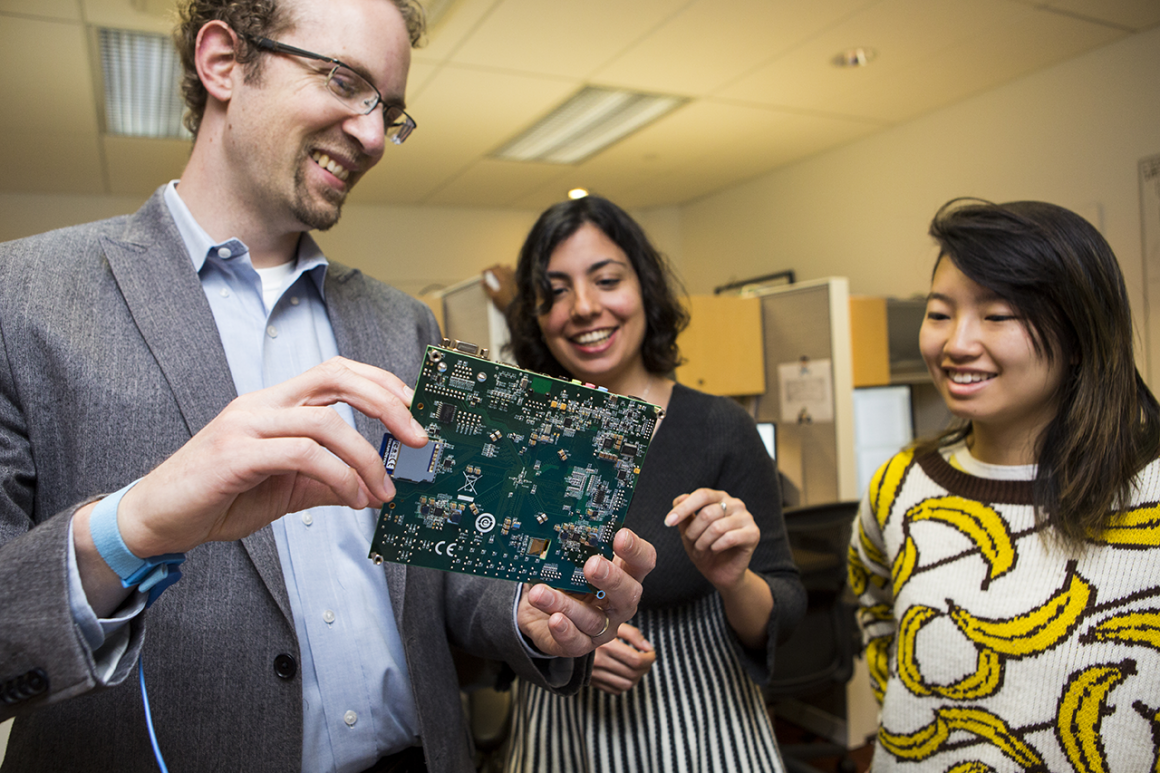Electrical and Computer Engineering

Electrical and computer engineering is central to most all areas defining the modern world; from robotics and biomedicine to advanced energy systems, wireless communications technologies, and next generation sensing methods. The department is dedicated to a collaborative and interdisciplinary approach to education and research for all our students, faculty, and staff.
Artificial Intelligence (MS)
Designed for students with a background in computer science, mathematics, or a related technical field, the MS in Artificial Intelligence curriculum covers AI concepts and techniques — including machine learning, deep learning, natural language processing, computer vision, and knowledge representation. Students will develop an ability to understand, implement, and deploy a wide range of AI technologies across disciplines, and they'll have the opportunity to work closely with faculty every step of the way.
Bioengineering - Signals and Systems track (MS)
The Signals and Systems track of the Bioengineering MS program educates biotechnology engineers in analysis and processing of signals with an emphasis on biomedical image processing and image formation; and design, control and synthesis of systems for biotechnology (e.g. development of miniaturized devices, circuits and systems, controller design for bioreactors).
Computer Engineering (BS, MS, cert.)
Design and analysis are key components of the Computer Engineering program. As students advance, they move into circuit analysis and design, digital design, computer programming, data structures, microprocessor design, and computer organization. With this strong knowledge base students are able to take advanced classes across the disciplines of computer engineering, electrical engineering, and computer science for example: VLSI design, computer networks, computer architecture, and image processing.
Data Science (BS, MS, cert., post-bacc)
Tufts School of Engineering is uniquely positioned to offer interdisciplinary data science programs, expanding research in the field and providing students with state-of-the-art facilities to work on projects and hone their skills. The MS in Data Science, MS in Data Science - Online, Post-Baccalaureate Certificate in Data Science, and Post-Baccalaureate Certificate in Data Science - Online programs are offered jointly by the departments of Computer Science and Electrical and Computer Engineering.
Electrical Engineering (BS, MS)
We develop the image processing and computer vision methods along with the computational systems that allow these machines to navigate their environment as well as the speech and natural language processing techniques required for robots to interact with people. Here at Tufts, design and analysis are key components of our program. Students may study a wide variety of topics including electric machines, semiconductor integrated circuits, VLSI design, biomedical engineering, microwaves and telecommunications, antennas and antenna systems, optical electronics, lasers, Fourier optics, fiber optics, digital image processing, semiconductor and optoelectronics materials, signal processing, switching circuit design, computer architecture, parallel processing, computer systems, and multimedia arts.
Electrical and Computer Engineering (PhD)
Candidates in electrical and computer engineering doctoral program focus on research and education in a wide variety of sub-disciplines, ranging from image and signal processing to nanoscale engineering and systems architecture.
Human-Robot Interaction (Joint PhD, MS)
The Human-Robot Interaction PhD program is interdisciplinary and seeks to understand and improve all aspects of interactions between humans and robots. The program draws on expertise from computer science and mechanical and electrical engineering, as well as psychology, philosophy, anthropology, and legal fields, among various others.
Materials Science and Engineering (Joint PhD)
Materials scientists study how the history of a material influences its structure and properties, advancing understanding in research areas that include metallurgy, solid-state physics, and biomaterials. The interdisciplinary Materials Science and Engineering PhD program offers graduate students a wide array of opportunities to study and develop materials that will change the world.
Microwave and Wireless Engineering (cert.)
With the availability of relatively inexpensive microwave components and improved digital communications, commercial opportunities in the microwave and wireless engineering industry have few limits. Radar, satellite, wireless radio and optical communication, and collision avoidance radar are just a few areas which utilize microwave technology. To develop faster computer circuits, computer hardware researchers and designers need to know more about microwave engineering concepts. As engineers explore low microwave frequencies and even lower radio frequencies, this technology will be applied to cable, broadcast, television, medical, and other commercial uses.
Product Development and Design (cert.)
The Certificate in Product Development and Design is for students and professionals who seek to solve complex problems from a holistic, design-oriented perspective. Whether you are an entrepreneur, administrator, civil servant, marketer, project manager, engineer, healthcare worker, educator, or advocate – this program will help you to discover solutions through the use of creativity, collaboration, and iterative design. Learn the fundamentals of design thinking and build solutions that have impact.